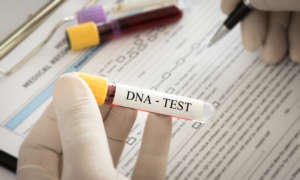“Hello?”
A soft, female voice said, “May I speak to Lynda Taylor please?”
“This is she.”
The woman hesitated, then said, “My name is May Stark. I don’t know how to tell you this, but I think we’re related. In fact, I think you’re my sister.”
“What? This is crazy. I don’t have any siblings.”
“Well, according to the DNA test I took for the genealogy site, Familytime, we are related and are probably sisters. Not sure how, but that’s what the results said.” The woman laughed nervously. “Surprise!”
Lynda sat down slowly at her kitchen table. She ran a hand through her hair and frowned. “I did a DNA test with that site a while ago. I was hoping to find cousins or something. I got no hits. But a sister? That would mean my Mom or Dad…”
“Your mom, actually. I was born in 1970. I submitted my DNA a few months ago.”
“That’s crazy,” Lynda said. “My Mom would have been 16.”
“Look, I am surprised as you are. I didn’t even know I was adopted. My parents and grandparents are dead, so I can’t ask them for any details. But this DNA test says we are sisters. I know your mother just died. Perhaps your father might know something?”
Lynda shook her head. “My father’s in dementia care. He has Alzheimer’s. His memory is gone.” She sighed. “Look. What do you want? Money? Because my mother’s estate has been settled. Everything went to my dad and he needs the money for his care.”
“Actually, I was hoping maybe you knew something about my past. You didn’t find anything in her papers? She never said anything about me or hinted she had another child?”
“Nope. Are you sure the DNA test is accurate? Maybe someone messed up somewhere. This is crazy.”


There was a time when DNA tests were a tool available primarily to the police and the courts. They were used to identify criminals or disqualify people from potential criminal charges. They were also used to establish or confirm paternity. However, the process was expensive and slow.
Now sites that cater to genealogists and people interested in finding family members have made such testing available to everyone. The tests are used to find biological connections or people related to by blood. As a result, tales of family found through DNA testing are becoming more common.
When a family connection is verified, the discovery of a long-lost relative could impact inheritance and estate plans. Even if the relative was unknown when the documents were prepared, they may have a right to inherit. That’s why it’s important that an estate plan anticipate and address the issue of unknown heirs. A grantor must decide whether they want to specifically include or exclude them from inheriting.
This situation is most likely to occur when a child was put up for adoption early in a grantor’s life. Many times, adoption records are sealed and the biological parents have no contact with the child or knowledge of their whereabouts. Some grantors may wish to make provisions for that child if they do indeed attempt to make contact after the grantor’s death.
In other cases, a grantor may be estranged from a child, but wishes to provide for any unknown grandchildren. In the alternative, a child or relative may have dropped off the grid, whereabouts unknown. There may also be situations where a male grantor is unsure whether they fathered a child from a past relationship.
Providing for unknown heirs requires specific language. For example, a will may specifically state that “assets are to be distributed to my current spouse and all children born of that marriage.” In the alternative, estate documents might say “all children and grandchildren related by blood, known and unknown” have a right to inherit.
It is important to be honest and open with your attorney when drafting your estate plan. While it may be embarrassing to disclose a child given up for adoption or the possibility of a child conceived through a prior relationship or an affair, the issue must be addressed to protect your estate and your acknowledged heirs. Providing as much information as possible will permit your attorney to draft documents that distribute your estate as intended.
[Ad] Are you a resident of Walnut Creek or the greater East Bay needing help with your estate plan? At Absolute Trust Counsel, your family’s safety is our number one priority. We understand how complicated it can be to know if you’re making the right legacy planning decisions, which is why we’re here to make things easier. Schedule a free discovery call, and let’s talk about how we can help build the right plan for you and your family. Or, if you have a question about the content in this blog, please feel free to get in touch with us by calling 925.943.2740 or sending an email to Info@AbsoluteTrustCounsel.com.
Our Absolute Trust Counsel team would love to offer all of you access to ATC’s Incapacity Planning resource page on https://absolutetrustcounsel.com/incapacity-planning/ We’ve collected our top planning information all in one place so listeners can find videos, guidebooks, blog posts, a host of information with tips and strategies on implementing, planning, and protecting themselves and their loved ones.
